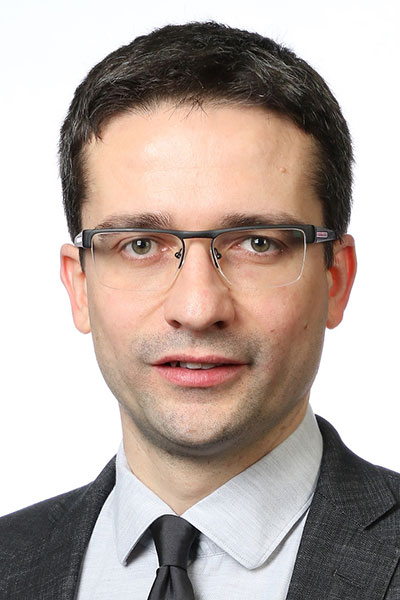ADVANCES IN PREGNANCY ASSOCIATED BREAST CANCER (PEOPLE’S CHOICE)
Friday, December 9 • 3:00 pm – 5:00 pm CT • Stars at Night Ballroom 1&2

Presentation: Oncofertility and other quality of life issues
Matteo Lambertini, MD, PhD
Associate Professor and Consultant in Medical Oncology
University of Genova and IRCCS Ospedale Policlinico Hospital San Martino
Genova, Italy
What is your presentation about?
My presentation will discuss oncofertility in young women with breast cancer, focusing on the risk of developing treatment-induced premature ovarian insufficiency and on the available strategies to preserve fertility and/or ovarian function before initiating chemotherapy. Moreover, I will discuss the current evidence on maternal and fetal safety of conceiving following proper treatment for breast cancer, as well as the practical issues to consider when planning for a pregnancy after completion of anticancer therapies. Finally, beyond fertility and pregnancy-related concerns, additional gynecological-related issues are faced by young women with breast cancer — among them, I will focus on contraception and sexual dysfunction that are of high relevance for many patients.
What makes this topic important in 2022?
The current availability of effective systemic treatment strategies has significantly improved the prognosis of patients with early breast cancer. However, this survival gain is often obtained at the cost of higher toxicity. The increase in life span among breast cancer survivors calls for the need to address both early and late potential adverse effects of anticancer therapies to maximize their quality of life. Among them, the potential gonadotoxicity of anticancer therapies and its implications on fertility and ovarian function need to be discussed with all young patients.
However, around this topic, there are still several misconceptions and important knowledge gaps that may lead to suboptimal practice. As an example, still many patients and their health care professionals have concerns about a potential negative prognostic effect of pregnancy on women’s oncological outcomes and about a possible negative impact of prior exposure to anticancer treatments on the pregnancy itself.
Moreover, notably, despite the growing availability of new effective targeted therapies in the early breast cancer setting and the current indication to perform a genetic test in all newly diagnosed young women, very limited evidence exists on the gonadotoxicity of targeted agents and the potential added burden on this regard of carrying a germline BRCA pathogenic variant. Hence, the oncofertility counseling of these patients is particularly complex and requires additional urgent research efforts to be improved.
How/why did you become involved with this area of breast cancer research or care?
For many young women with breast cancer, the chance to have a child is a top priority. As an oncologist dedicated to the care of young women with breast cancer since the early phases of my career, I have experienced every day the unique needs and issues faced by these patients, including their wish to return to a normal life following treatment completion and to fulfill their dream to become mothers.
During my medical oncology training and my subsequent PhD, I had the opportunity to work and collaborate with several national and international leading experts in the care of young women with breast cancer; these experiences have played a crucial role to deepen my skills in this field. Moreover, I have had the chance to be involved and to develop several projects that have contributed to improving our understanding of many controversial aspects related to the management of breast cancer in young women. All these experiences, together with my daily clinical practice, have always been and keep on being a source of great motivation to help further improving the care and quality of life of these young women and helping them to have a life after cancer as similar as possible to what it was before the diagnosis of this disease.

